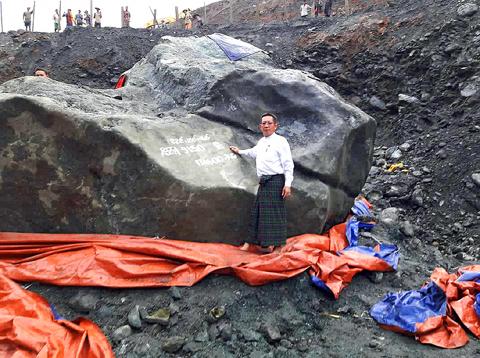A 174-tonne piece of jade worth millions of dollars that was uncovered in Myanmar is to stay where it is for now — because its owners do not have equipment strong enough to move it.
The 5.8m-long stone was discovered by miners in northern Kachin State last week, buried up to 60m deep inside a mountain.
“When the edge of the stone was scratched we could see the quality of the jade inside — the quality is very good,” said Tint Soe, 56, a local lawmaker.

Photo: AFP
While some have estimated the rock could be worth more than US$170 million, Tint Soe said its value was probably closer to US$5.4 million.
Jade is traditionally used for charms and bracelets, but Tint Soe said the company had not yet decided what this particular find would be used for — and have no way of moving it anyway.
“Currently the jade stone cannot be moved as there is no machine that can do it here, and no road either,” he said.
Myanmar is the source of nearly all of the world’s finest jadeite, a beautiful green stone highly prized in China where it is known as the “stone of heaven.”
Companies linked to the former military junta dominate the trade, which Global Witness valued at about US$31 billion in 2014 alone — equivalent to about half the country’s GDP.
Mining of the stone can extract a high human cost, with fatal mine collapses common — about 100 people died in a major landslide in November last year.
Most of the precious stone is smuggled across the border into China.

RECYCLE: Taiwan would aid manufacturers in refining rare earths from discarded appliances, which would fit the nation’s circular economy goals, minister Kung said Taiwan would work with the US and Japan on a proposed cooperation initiative in response to Beijing’s newly announced rare earth export curbs, Minister of Economic Affairs Kung Ming-hsin (龔明鑫) said yesterday. China last week announced new restrictions requiring companies to obtain export licenses if their products contain more than 0.1 percent of Chinese-origin rare earths by value. US Secretary of the Treasury Scott Bessent on Wednesday responded by saying that Beijing was “unreliable” in its rare earths exports, adding that the US would “neither be commanded, nor controlled” by China, several media outlets reported. Japanese Minister of Finance Katsunobu Kato yesterday also

Taiwan’s rapidly aging population is fueling a sharp increase in homes occupied solely by elderly people, a trend that is reshaping the nation’s housing market and social fabric, real-estate brokers said yesterday. About 850,000 residences were occupied by elderly people in the first quarter, including 655,000 that housed only one resident, the Ministry of the Interior said. The figures have nearly doubled from a decade earlier, Great Home Realty Co (大家房屋) said, as people aged 65 and older now make up 20.8 percent of the population. “The so-called silver tsunami represents more than just a demographic shift — it could fundamentally redefine the

China Airlines Ltd (CAL, 中華航空) said it expects peak season effects in the fourth quarter to continue to boost demand for passenger flights and cargo services, after reporting its second-highest-ever September sales on Monday. The carrier said it posted NT$15.88 billion (US$517 million) in consolidated sales last month, trailing only September last year’s NT$16.01 billion. Last month, CAL generated NT$8.77 billion from its passenger flights and NT$5.37 billion from cargo services, it said. In the first nine months of this year, the carrier posted NT$154.93 billion in cumulative sales, up 2.62 percent from a year earlier, marking the second-highest level for the January-September

Businesses across the global semiconductor supply chain are bracing themselves for disruptions from an escalating trade war, after China imposed curbs on rare earth mineral exports and the US responded with additional tariffs and restrictions on software sales to the Asian nation. China’s restrictions, the most targeted move yet to limit supplies of rare earth materials, represent the first major attempt by Beijing to exercise long-arm jurisdiction over foreign companies to target the semiconductor industry, threatening to stall the chips powering the artificial intelligence (AI) boom. They prompted US President Donald Trump on Friday to announce that he would impose an additional